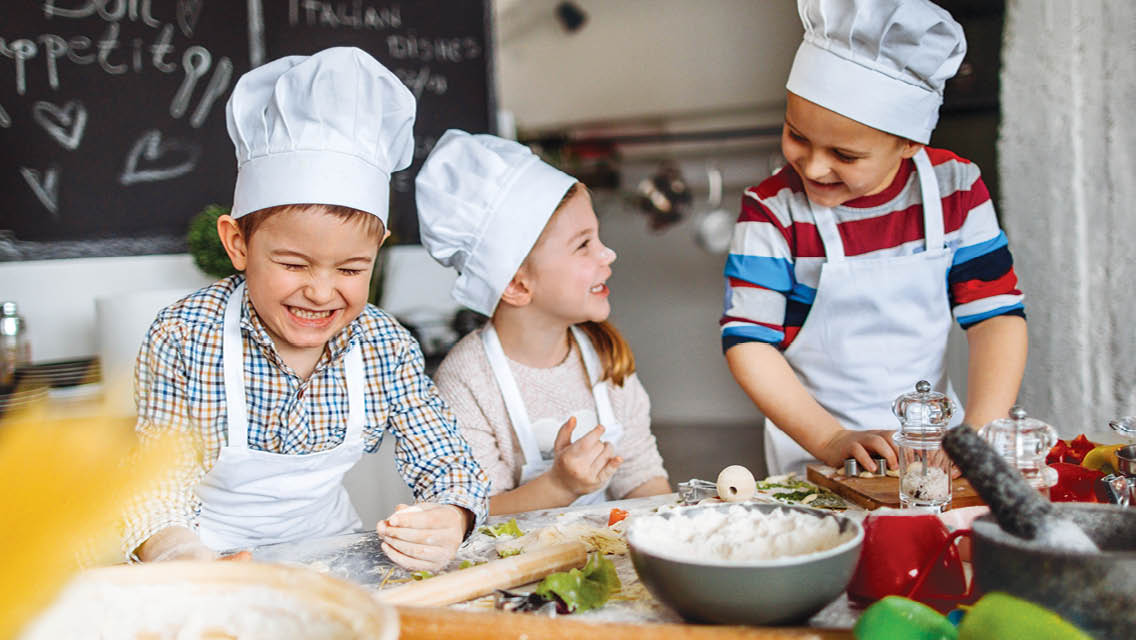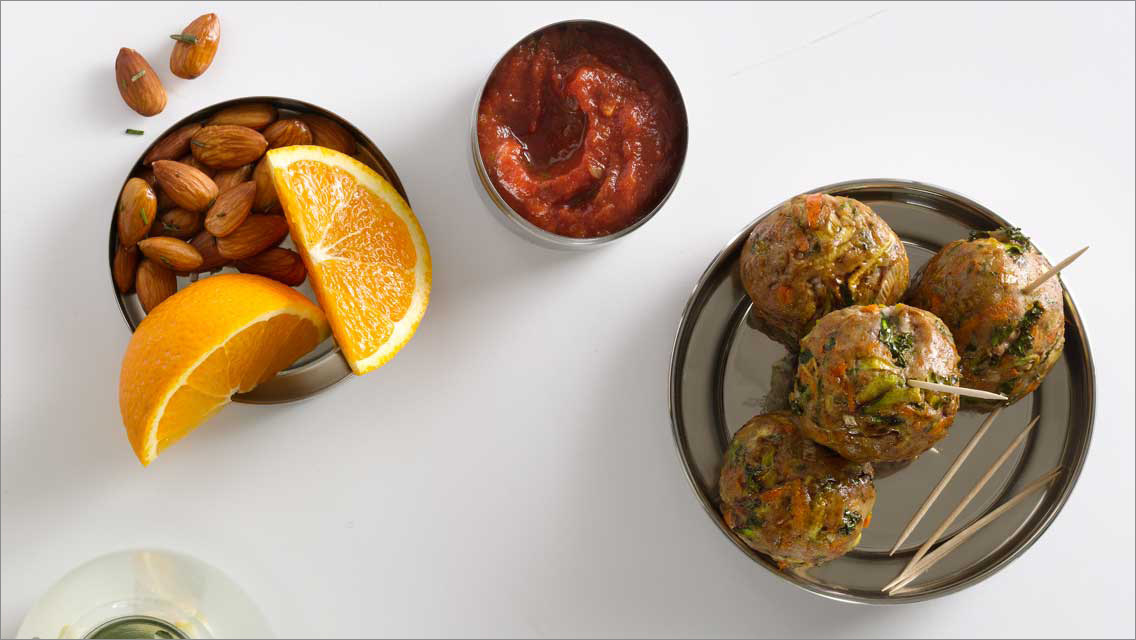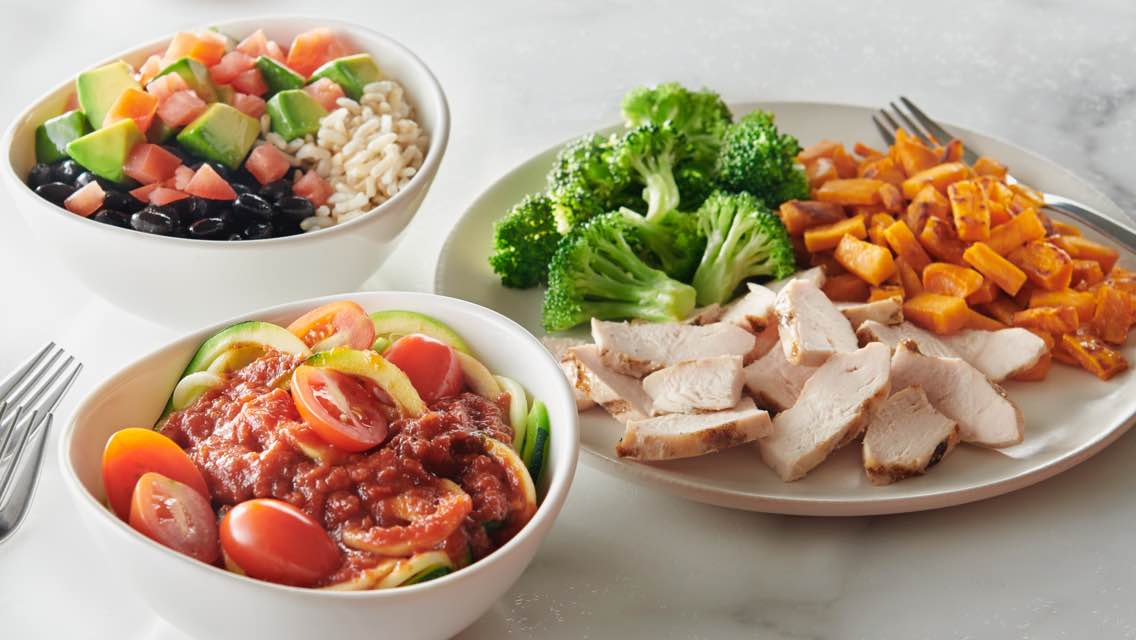Raising healthy eaters is no small feat. After all, you can match wills with a 6-year-old staring down a broccoli floret for only so long. But it may be easier than you think to persuade your kids to experiment with new foods.
Just hand them an apron and invite them to join you in the kitchen.
“Cooking really gets kids excited,” says Dawn Susi, associate director of programs at Common Threads, an Austin, Texas-based national nonprofit that provides cooking and nutrition education to families. “The more they’re involved, the more likely they are to eat what they’ve helped to prepare.”
All that seeing, smelling, touching, and tasting adds up to a willingness to try new foods. But inviting children to help in the kitchen does more than encourage adventurous eating: It also empowers them to accept greater responsibilities and participate in family life in new ways. It fosters creativity and independence. And it makes positive memories around food and family — for you and your kids.
Setting Expectations
Of course, you can’t just hand your preschooler a paring knife and put her to work.
“Supervision and safety are always top priorities,” says Susi, who suggests setting ground rules for preteens, such as always asking permission to work in the kitchen. Basic sanitation is also important, so reinforce handwashing and take steps to prevent cross-contamination in age-appropriate ways while working with food. (For more information on food safety, see “8 Food Safety Myths“.)
That said, the kitchen can also be a place for kids to experiment with managed risks.
“I really believe in risk-taking and resilience,” says Shana Henry, a former Waldorf educator and now program director at Skyline Camp and Retreat Center in Almont, Mich., which offers cooking and nature-based classes for children and adults. “There are great kid-safe knives made of hard plastic that you can use with little ones.”
Yes, even preschoolers, Henry says, as long as they’re supervised.
Just as you’ll set ground rules for your kids, you’ll want to manage your own expectations. Depending on how many children you’re wrangling — and how old they are — it might be best not to aim to get dinner on the table by 6:30 on a Tuesday.
“Avoid time constraints,” advises registered dietitian Molly Pass, MPH, RD, a consultant with the Life Time Foundation. “You don’t want anything that’s going to make kids feel rushed or agitated.” Set aside weekend time or focus on one recipe rather than a full meal.
Every kid is different, of course, so consider the following expert-sourced guidelines and age-appropriate kitchen tasks — they can help set you and your young ones up for cooking success.
Age 3 and Under
Toddlers are eager to help, so get them started with tasks little hands can manage, such as tearing, kneading, and squishing. Draw their attention to the textures of different ingredients. Let them taste what they’re helping to prepare. “It’s all about getting them comfortable with food,” says Susi.
Making marinara? Let your kiddo tear the leaves from a sprig of basil. Rough-chop some tomatoes, put them in a bowl, and watch your toddler mash them up to break them down further. “You’re not worried about the mess,” notes Henry. “You’re basically going to let this child play with some tomatoes while you’re getting everything else done.”
Even babies benefit from spending time in the kitchen. “They’re developing their senses, so put them in a highchair where they can watch and take in the sounds of cooking,” suggests Pass. “Talk to them while you cook and let them play with a spoon.”
Tasks the smallest chefs might enjoy:
- Mixing batter with their hands
- Tearing herb leaves off stems
- Mashing up well-cooked potatoes (cooled to room temperature)
- Kneading dough
- Tipping out measured spices or other ingredients into bowls
- Practicing cutting soft foods with a safety knife if they’re ready
Age 4 Through 6
As fine-motor skills become more developed, kids’ help in the kitchen can start to become more . . . helpful.
“Give them little tasks they can do on their own,” advises Susi. “That’s going to create that sense of pride and independence.”
A little planning on your part can make everyone’s experience more enjoyable. For instance, you can prep veggies and other ingredients and put them in bowls, then ask the children to assemble salads or pizzas.
Teach them to set the table by first having them follow you, adding a spoon after you place the forks and knives. Consider moving some dishes to lower cabinets so kids can be responsible for getting them out and putting them away.
“You don’t need to use plastic dishware to cook with kids of any age, really,” adds Henry. “You just teach them very young to walk slowly and to take care of their things. When something breaks, you clean it up and get over it.”
Some tasks the kindergarten set is ready to handle:
- Cracking eggs (you’ll have to fish out some shell bits, and make sure they wash their hands!)
- Washing vegetables
- Cutting soft veggies and fruits with a safety knife
- Tearing salad greens
- Setting the table
- Clearing the table
- Rinsing dishes
Age 7 Through 10
This group is ready to take on more demanding tasks with less supervision. “There will always be hazards in the kitchen,” Susi admits, “but you can take a bit more of a hands-off approach at this age.”
Ask youngsters to peel vegetables, scoop avocados, and pour liquids. “They can spoon out cookie dough and make beef patties,” suggests Pass. “If you’re making kebabs, they can skewer the meat and veggies in a pattern — that’s where their creativity comes in.”
Kids who already have some kitchen hours under their belts may be ready to cook more independently, says Henry. “If they’ve been cooking since they were little, by now they’re able to follow a recipe.” And if not, now is the time to introduce this skill.
Following recipes reinforces the math, reading, and science they’re learning in school. “‘I need half a cup of sugar: What does that mean? How do I do that?’ Kids in this age range are capable of figuring that out,” notes Pass.
Some tasks grade-schoolers are ready to take on:
- Cutting and peeling veggies
- Slicing bread
- Using a Microplane
- Using a can opener
- Putting trays and pans into ovens
- Cooking over the stove
- Reading and following a recipe
- Measuring ingredients
Age 11 and Up
With each passing year, kids can handle more responsibility and independence. And if this is the age they’re just getting started in the kitchen, fear not — they’ll catch up quickly.
“Older kids are the ones I have the most fun with, because they have the ability to focus on what you’re saying,” says Susi. They crave independence and are more willing to watch, learn, and try things on their own. “Obviously you always have that constant supervision and you’re reiterating safety techniques,” she adds.
But try not to hover over them too much. “Let them experiment a little bit,” advises Henry. Give them space to spread their wings, and as they reach their teen years, they’ll be confident enough to be the head chef once in a while.
“I’ve met older children who, by high school, find that taking responsibility for two or three dinners a week brings them joy and purpose,” says Henry. “We all need purpose, and for some kids, it’s going to be feeding their family.”
Some responsibilities you can start turning over to older kids:
- Learning and practicing more advanced knife skills, like dicing and mincing
- Using the stove and oven
- Helping to plan menus and make grocery lists
- Preparing simple meals with minimal supervision
- Cleaning the kitchen and washing dishes
This article originally appeared as “Young Chefs” in the May 2022 issue of Experience Life.





This Post Has One Comment
When it comes to teaching kids how to cook, knowing what they can handle based on their age is important. This helps you save time while keeping them safe in the kitchen.